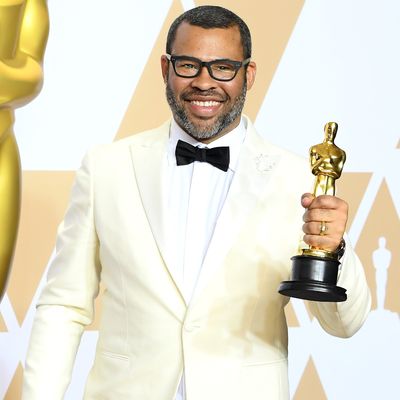
Although Get Out won only one award out of its four nominations, writer-director Jordan Peele’s Best Original Screenplay Oscar was one of the most significant victories of the night — and a historic accomplishment on multiple fronts. Not only did Peele become the first black person in the Oscars’ 90-year history to receive this particular award, he delivered the first original horror story to triumph in the category on Hollywood’s most Establishment-friendly night. And his precedent-setting achievement may end horror’s status as an interloper in conversations about prestige cinema.
It’s true that the Academy has fêted great suspense genre films in the past: In 1991, Jonathan Demme’s Silence of the Lambs won five of the eight major Oscars categories, including both lead acting awards, Best Adapted Screenplay, and Best Picture. Seventeen years before that, William Friedkin’s The Exorcist was nominated for ten trophies, and won two, including an Adapted Screenplay award of its own. But Get Out’s win makes it a more significant bellwether for horror’s future because of the film’s extremely specific makeup: The risky nature of its narrative, the experience of its lead creative, and its embedded social critique demonstrate the unique power of horror films to tell our most urgent stories.
Impressive as Exorcist and Lambs are, they feel more like accomplishments in good shepherding and impeccable filmic execution than they do expressions of genre brilliance on behalf of Demme and Friedkin, who did not create these stories out of whole cloth. They’re classics, and first-rate scary stories to tell in the dark, but they feel safe compared to Get Out’s thesis — that being nonwhite in America is so fundamentally dangerous, it makes the experience of daily life akin to a horror film; and that the presence of danger is so commonplace, it can even be absurdly hysterical — and its point of view, the eyes of a terrified black man.
With no pre-vetted source material or star power in the vein of Anthony Hopkins or Jodie Foster to sell his film, Peele made Oscars history on pure strength of story and originality of vision. He had only a good idea — and the promise of something never seen before onscreen. Get Out dictated discourse around social issues, and sustained the industry conversation for an entire year between the theatrical release and its Oscar win (not to mention becoming one of best-reviewed films of all time — literally). And it won despite significant bias: One Oscars voter told The Hollywood Reporter that he enjoyed Get Out, but wrote it off as a “B-movie.” It’s a title well-earned by many horror movies, but also a typically lazy dismissal of the genre’s unique ability to deliver visceral, incisive social commentary in a manner not afforded to more polite (a quality often conflated with intelligence) types of films. Another told Vulture, “I had multiple conversations with longtime Academy members who were like, ‘That was not an Oscar film.’ And I’m like, ‘That’s bullshit. Watch it.’ Honestly, a few of them had not even seen it and they were saying it, so dispelling that kind of thing has been super important.”
Even more astonishing is the fact that Peele, the Establishment newcomer, won Academy voters over with a movie that made a villain of many of its members: the well-meaning white liberals who don’t realize their own internalized racism enables the continued, systemic exploitation of black and brown bodies in America. It’s one thing to win on the strength of a movie that makes viewers feel good; it’s an entirely different level of achievement to earn someone’s vote by making them feel culpable.
Peele has been amassing honors for months now on the awards circuit, but it’s his Original Screenplay Oscar — which is essentially an award for Best Movie Idea of the Year — that truly validates horror as a nimble genre, capable of delivering a Holy Hollywood Trinity: luxurious profit margins for studios, big entertainment for fans, and the most incisive anthropological analysis for the culture. Peele kicked the door open — now studios just need to let a generation of new horror filmmakers follow him through.


